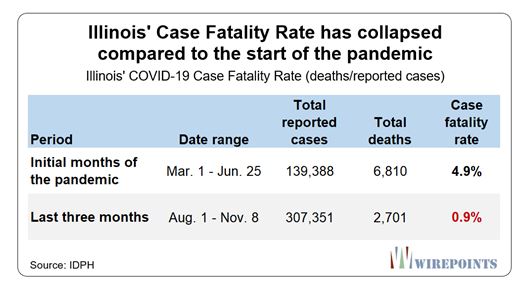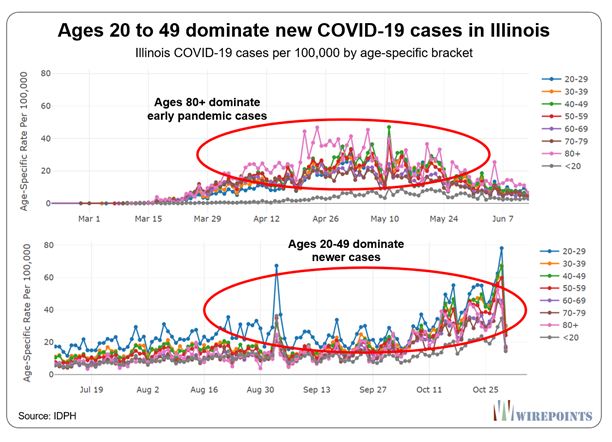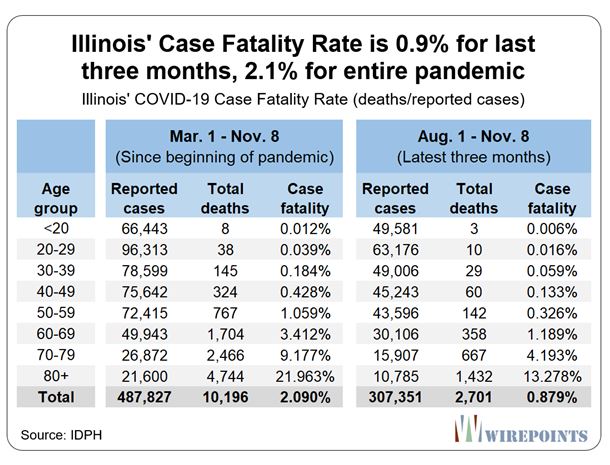GENERAL ASSEMBLY
Leader Jim Durkin unanimously reelected to lead the House Republican Caucus in the 102nd General Assembly. The choice was finalized at a meeting of the Caucus held on Thursday, November 12.
“This evening, the House Republican Caucus reelected Leader Durkin by a unanimous voice vote. The caucus is united in continuing its fight to bring ethics reform and fiscal discipline to Illinois.”
The House Republican Caucus met in Springfield under conditions of social distancing and followed all CDC guidelines including wearing masks and temperature checks. A quorum of members was present and proxy votes were accepted for members who could not attend.
Fall veto session canceled. The Illinois House and Senate are constitutionally required to meet every fall in what is called “veto session,” so called because the session usually includes scrutiny of the Governor’s vetoes and possible veto overrides. In 2020, the veto session was scheduled to begin on Tuesday, November 17 and continue until Thursday, December 3.
The State currently faces policy catastrophes on several separate levels, and Springfield and its performance are deeply implicated. State government is currently spending money at a rate that is almost $4 billion dollars more, per year, than is being paid in taxes. The State’s response to the current COVID-19 pandemic has cost tens of thousands of jobs across Illinois and has not halted the spread of the virus. However, the General Assembly’s leadership has taken steps to cancel the veto session and prevent Illinois lawmakers from meeting to deal with this ongoing crisis.
BUDGET
Budget hole currently estimated at $3.9 billion for FY21. The number comes in a letter from Gov. Pritzker to House Republican Leader Jim Durkin and the other three General Assembly legislative leaders. The letter constitutes an admission that the budget passed by Democrats in the May 2020 special spring session was not actually balanced as required by the Illinois Constitution.
Fiscal Year 2021 (FY21) began on July 1, 2020 and will end on June 30, 2021. As of mid-November 2020, four and a half months of this twelve-month period have already gone by. Much of the FY21 spending in this fiscal year has already been spent, or has been committed to be spent in various ways. The general funds budget walkdown prepared by the Governor’s Office of Management and Budget shows that the State is on track to spend almost $43.1 billion in budgeted expenditures during a period in which less than $39.2 billion in income taxes, sales taxes, and other revenues will be coming in.
House Republican Leader Jim Durkin sharply criticized the budget picture presented by Gov. Pritzker. Pointing to long-term fiscal mismanagement by the Democrat majority, Leader Durkin urged his colleagues and the Governor to start looking at taking systematic steps to reduce the State’s ongoing budget deficit. The growth in this structural deficit is driven by a wide variety of factors, of which the two most significant are growth in welfare health care costs and growth in pension payments.
$9.1 billion backlog of unpaid bills. This week, the Comptroller’s office released its count of unpaid vouchers submitted to Illinois for payment, and not yet paid. As of Monday, November 9, 82,656 vouchers had been submitted and placed on backlog. The unpaid debts represented by these vouchers are more than $9.1 billion. This number is not a record high for Illinois, but it represents a red-ink total that has not been seen in two and a half years. In early 2018, the unpaid bill total was over $9 billion.
While these unpaid bills cover a wide variety of goods and services, a large percentage of the unpaid bills have been submitted by health care providers for care and treatments provided to persons on Medicaid or other taxpayer-funded health insurance plans. All of these bills will have to be paid, eventually, by Illinois taxpayers. Furthermore, the existence of this major pile of unpaid bills makes it tougher for Illinois to borrow money to meet its immediate cash-flow needs.
COVID-19
Case counts show that viral resurgence continues. Many Illinoisans who ask to be tested for COVID-19 are showing positive test results, indicating that they have been infected by the virus. Additional public health regions within Illinois, including Regions 5, 7, and 8, are being moved to Tier 2 mitigation, which imposes strong additional bans on public gathering. These bans fall with special force upon places that serve food and drinks to customers. In addition, within regions under Tier 2 mitigation, indoor and outdoor meetings and gatherings – this includes such things as family picnics in public parks – are limited to 10 people. Organized group and recreational activities – this includes activities such as children’s soccer games – are limited to 25 guests or, if indoors, to 25% of the overall room capacity.
Region 5 covers much of Southern Illinois, Region 7 is a two-county region south of Chicago (Kankakee County, Will County), and Region 8 is a two-county region west of Chicago (DuPage County, Kane County). All three of these regions are now in Tier 2 mitigations after showing average COVID-19 positivity rates of 11% or more – in other words, for every nine people who are tested, at least one person has contracted the virus. All of these regions are already under coronavirus mitigation orders. A fourth region of Illinois, the Northern Illinois “Region 1” that centers on the counties the cover Rockford and its environs, is already under Tier 2 mitigation orders.



Illinois Department of Public Health (IDPH) prepares to roll out COVID-19 vaccines. One early version of a vaccine against coronavirus was announced this week by pharmaceutical giant Pfizer. The Pfizer vaccine is said to be highly effective at protecting those who take it against coronavirus. On the other hand, it must be given in two doses (many vaccines are like this: polio vaccine, for example) and requires careful shipping and handling.
Distribution of the vaccine will be the responsibility of the public health authorities of the 50 states. In Illinois, IDPH will face the heavy challenge of a mass vaccination campaign to be carried out under conditions of public skepticism and concerns over availability. The Pfizer vaccine will be cumbersome to transport, and the “first wave” of vaccinations will only cover a small percentage of the total U.S. population as a whole.
ETHICS
Republicans on Special Investigating Committee Demand the Committee Get Back to Work. After learning that yet another meeting of the Special Investigating Committee (SIC) into the conduct of House Speaker Michael J. Madigan was canceled and work of the committee has been postponed indefinitely, Republicans serving on the bipartisan panel are demanding the committee get back to work.
At the end of August and based on information included in a deferred prosecution agreement between Commonwealth Edison and the US Attorney’s Office of Northern Illinois, a petition was filed to create an investigating committee to determine whether Speaker Madigan had engaged in conduct unbecoming of a legislator, which constituted a breech in the public trust. Since that time, the committee has only met twice and has only heard from one voluntary witness. Efforts to issue subpoenas to Madigan and others with intimate knowledge of the ComEd bribery scheme were blocked at both meetings. Now, with just weeks remaining until the SIC dissolves at the conclusion of the 101st General Assembly, Republicans are demanding immediate action.
“All SIC Chairman Chris Welch and Democratic committee members Natalie Manley and Elizabeth Hernandez have done is throw up roadblocks as they continue to act as human shields to protect their mentor and leader Mike Madigan,” said SIC member Representative Grant Wehrli. “People have lost all faith and trust in state government and this is a perfect example of why. House Rules, written by Madigan and approved by Welch, Manley and Hernandez, provide for the creation of this type of committee, including subpoena powers, so that legislators can be held accountable. When Democrats decide those rules don’t apply to Mike Madigan, they only add to the ethical stain on state government.”
At a press conference on Monday, Wehrli went on to suggest that all three Democrat members of the SIC are placing their unwavering loyalty to Speaker Madigan ahead of doing what is right. “It’s been 71 days since the petition to form this committee was filed, and six weeks since our last meeting,” continued Wehrli. “The work of the SIC is legitimate, and it’s too bad the Democrats are turning our proceedings into a kangaroo court. Speaker Madigan was named 72 times in the deferred prosecution agreement, so this isn’t about politics; it’s about restoring faith and trust in state government. Chairman Welch has draft subpoenas in hand and they await SIC action. We can meet in person or on Zoom to conduct this business. There is no ethical reason for continued delays.”
House Republicans Demand House Democrats Stand up to Madigan, Corruption. Illinois House Republican caucus members held a Zoom press conference on Tuesday to demand their Democrat counterparts in the House stand up and speak out against the continued reign of long-time House Speaker Mike Madigan. The Republicans agree with top Democrats that Speaker Madigan’s time in leadership is up.
“When people think of Illinois, they think of corruption. This culture developed over decades while Mike Madigan ruled as Speaker of the House,” said State Rep. Mark Batinick. “The General Assembly simply cannot function with him as Speaker. Every decision, every vote, every committee hearing is stained with mistrust. If last Tuesday taught us anything, it is that Illinoisans have lost all trust and faith in their government. Trust in state government does not improve until we have a new Speaker of the House. Mike Madigan must go.”
State Rep. and Assistant Minority Leader Avery Bourne argued that continued silence by members of the Democrat party is a tacit endorsement of continued corruption.
“It’s time for House Democrats to show some political courage and leadership,” said State Rep. Avery Bourne. “House Republicans are united against Mike Madigan as Speaker, and as of today eight House Democrats have stated publicly that they too will not support him. If five additional Democrats are willing to say enough is enough and it’s time for a change, Mike Madigan’s days as Speaker of the House are over. I’m calling on Illinoisans to contact their representatives and ask that they vote no on Mike Madigan serving as Speaker of the House. Silence in this case, is an endorsement of a continuation of the culture of corruption Mike Madigan has overseen.”
Rep. Mike Marron says his short time in Springfield has illuminated the number one problem facing the state. “When the entire State’s legislative priorities are dependent on gaining favor from one single individual, in this case Mike Madigan, we’ve got a problem,” Marron said. “This democracy that we all love and fight for and rely on is constantly thwarted because Mike Madigan has consolidated so much power that he can single-handedly decide if important legislation moves forward. He’s been in state government since before I was born! Dick Durbin, Tammy Duckworth, and JB Pritzker have all called his leadership at the top of their party problematic. I don’t care about whether it’s a problem for Democrats politically. Mike Madigan’s continued leadership of the House of Representatives needs to end as soon as possible so a democratic process can be restored and followed.”
GAMBLING
Commission on Government Forecasting and Accountability (CGFA) issues report on Illinois gaming industries. Legalized gambling has become one of the largest industries in Illinois. Although it has the reputation of being a fast-growing industry, however, gambling generated less money for the State in the most-recently-completed fiscal year. The 13.4% decrease, to $1.215 billion in FY20, was attributed to the effects of the COVID-19 coronavirus pandemic and consequent shutdown of many locations where gaming takes place. Riverboat casinos, and most locations that serve as host locations for video slot machines, both had to shut their doors.
Despite these challenges, more than 4,000 new video gaming machines were installed in Illinois in FY20. The machine count rose from 32,033 terminals on June 30, 2019, to 36,145 terminals on June 30, 2020. This machine count increase continued the video game industry’s status as the second-largest sector of overall gambling in Illinois, exceeded only by the Illinois State Lottery.
Illinois continues to implement changes to its gambling laws. These changes have already legalized sports betting, including limited online sports betting. Additional changes to state law could lead to the construction of a new land-based casino in the city of Chicago. After the Chicago-casino law was enacted in May 2019, the financial effects to the gaming industry caused by the pandemic delayed implementation of the new law. Online sports betting activities were not physically affected by the pandemic, but were hit by the partial shutdown of the underlying U.S. sports events on which bets are made. Illinois live horse racing continued in decline in FY20, with three tracks remaining in operation – Arlington, Fairmount, and Hawthorne.
The CGFA report was released on Monday, November 9.
TRANSPORTATION
New bridge carries Interstate 74 traffic across the Mississippi River at the Quad Cities. The new I-74 bridge, which connects Moline, Illinois, with Bettendorf, Iowa, is scheduled to open for westbound traffic on Friday, November 13. The massive bridge is being opened in stages, with eastbound traffic scheduled to shift onto the new bridge sometime in the winter of 2020-21.
The $1.2 billion bridge project created full-time jobs for more than eight years. Engineering planning work began in 2012, and the groundbreaking took place in June 2017. Massive quantities of work were required for both the bridge spans across the river itself and the maze of approach ramps feeding traffic onto the bridge from both sides of the river.
Following completion of the new bridge and the opening of the eastbound lanes, the old Iowa-Illinois Memorial Bridge is scheduled to be torn down. The oldest half of the venerable suspension bridge began carrying traffic eighty-five years ago, in November 1935.
VETERANS
GOP Lawmakers Demand Public Hearing Concerning COVID-19 Outbreak at LaSalle Veterans’ Home. Republican members of the Illinois House Veterans’ Affairs Committee sent a letter demanding the chair of the House Veterans’ Affairs Committee convene a public hearing as soon as possible following recent reports detailing an outbreak of COVID-19 among employees and residents at the LaSalle Veterans’ Home.
“We must quickly investigate how and why a recent outbreak occurred and what steps are being taken by the Pritzker administration to stop the spread of COVID-19 at all State-run veterans’ homes and health care facilities,” said State Rep. Randy Frese, Republican Spokesperson for the House Veterans’ Affairs Committee. “Our veterans now depend on us, and we cannot let them down. We stand ready to get to work to assist in providing the highest quality healthcare for all Illinois veterans.”
According to data provided to the media by Illinois Department of Veterans’ Affairs (IDVA) Administrator Angela Melbrech, 62 residents and 69 employees have tested positive for COVID-19 since Friday, November 6. The increase in cases at the LaSalle Veterans’ Home is frightening and leaves lawmakers with many unanswered questions about the failures in protocol that has caused such a widespread outbreak.
“It’s critical that a public hearing is convened by the Veterans’ Affairs Committee to include administration officials from the IDVA and the Governor himself so we can investigate what is happening inside Illinois run veterans’ homes concerning mitigation efforts to control the spread of COVID-19,” said Rep. Swanson, a member of the Illinois House Veterans’ Affairs Committee. “Ensuring top quality health care and protecting Illinois’ sons and daughters that bravely wore the uniform of the United States Armed Forces should remain among the priorities of the Illinois legislature, and indeed all Constitutional officers.”
All Republican members of the Illinois House Veterans’ Affairs Committee signed onto the letter to demand a public hearing concerning the outbreak of COVID-19 at the LaSalle Veterans’ Home. Republican members of the House Veterans’ Affairs Committee include; State Representatives Randy Frese, Dan Swanson, Dave Severin, Jeff Keicher, Mike Murphy, Brad Stephens, and Mike Unes. The letter was sent to the House Veterans’ Affairs Committee Chairperson, State Representative Stephanie Kifowit.
Rep. Frese added, “I communicated with Rep. Kifowit on Tuesday evening and was assured a public hearing will be scheduled. My Republicans colleagues and I stand together holding deep concern for the thousands of veterans living in Illinois under the care and supervision of the Department of Veterans’ Affairs. We demand a public hearing as soon as possible.”
